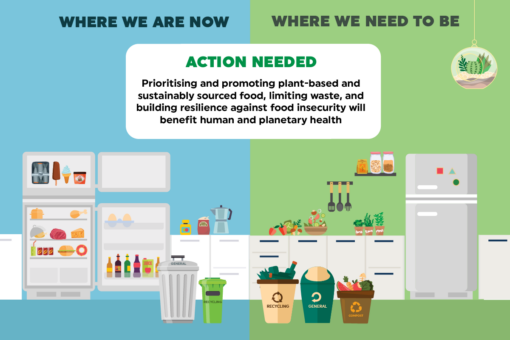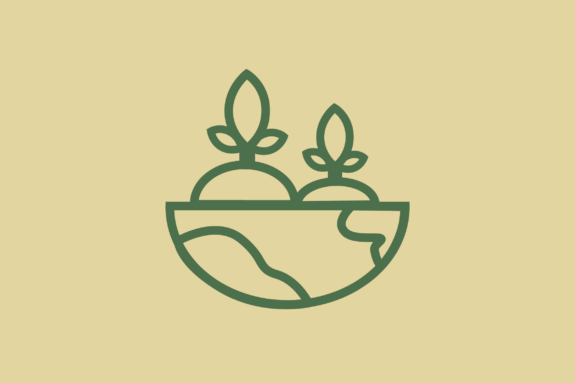
Globally, the food system is the primary driver of terrestrial biodiversity loss, principally caused by the conversion of natural ecosystems for crop production or pasture resulting in the loss of habitats. High dependence on the use of fertiliser, pesticides, energy, land and water, and on unsustainable practices, such as removing hedgerows, has reduced the variety of landscapes and habitats and threatens existing ecosystems. Animal farming for meat and dairy production uses more land and water than growing fruits and vegetables. Animal-sourced diets have a 14 times higher environmental impact than plant-sourced diets. Diets rich in red meat and processed food are associated with increased risk of diabetes, cardiovascular diseases and cancer.
Food production patterns are responsible for one-third of greenhouse gas emissions globally and animal-based food accounts for more than 50% of these. Climate change is threatening food security through rising temperatures, water scarcity and extreme weather events. The UK relies heavily on importing fresh fruits and vegetables; around one-third of these come from climate-vulnerable countries with long supply chains. The fragility of these chains became starkly apparent at the beginning of the Covid pandemic.
A significant proportion (≈40%) of the food produced for human consumption is wasted globally. In the UK, 9.5 million tonnes of food are thrown away every year; households are responsible for 70% of the UK’s food waste. Food waste is associated with more than 25 million tonnes of greenhouse gas emissions and an economic cost of over £19 billion per annum. As the global population is rapidly expanding, the demand for easy access to affordable, calorie-rich and resource-intensive foods is growing. This further aggravates environmental degradation and has poor health impacts manifesting as obesity and related diseases.
Human beings need to consume a diet with diverse nutrients to meet the requirements of the body. Diversity in the variety of foods consumed underpins dietary health and good nutrition, yet about 40% of crops consumed by humans come from just three crops (rice, wheat and maize) and 95% of the total food from livestock is from only five species (out of about 40 species that contribute to food production). The loss of genetic diversity in the food system increases vulnerability to crop disease outbreaks, reduces dietary and nutritional value, and limits the diversity of pollinators and key ecosystem support such as pest and disease control. Global declines in pollinator species diversity and in the number of pollinators also negatively impact the quantity, nutritional content, and quality of food, further threatening food security, agricultural productivity, and human nutrition. Biodiversity helps increase agricultural resistance while monocultures are more prone to pests and diseases.
Changing the way we produce and consume food is critical to protecting biodiversity, reducing greenhouse gas emissions, adapting to climate impacts, and improving health while reducing pandemic risks and the rising burden of antimicrobial resistance. Due to the disproportionate impact of animal farming on biodiversity, land use and the environment, we need to shift to diets based more on plants while reducing the consumption of animal-based diets (by over 50%). Currently, more than 80% of farmland in the UK is dedicated to raising animals as food. Globally, it is estimated that a transition away from animal agriculture towards a plant-based food system would allow the release of more than three-quarters of farmland back to nature, whilst providing the opportunity to repurpose land to sequester carbon. This should happen in parallel with the implementation of nature-friendly, farming methods that protect animal welfare and significantly reduce food wastage. Such a shift will positively impact human health.

Prioritise and promote plant-based and sustainably sourced food, limit waste and build resilience against food insecurity.
This can be achieved through a transition to sustainable diets by committing to prioritising plant-based and sustainable food while reducing meat and dairy consumption and food wastage. A parallel shift to refocus subsidies on sustainable agricultural production is needed.
